Locally-bred police dogs assets in crime fight
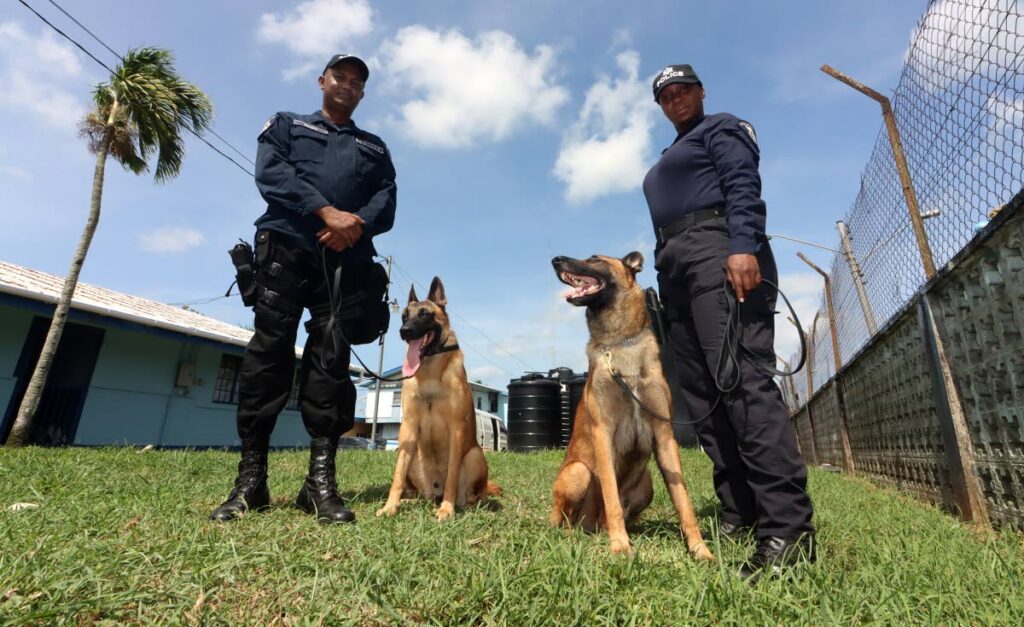
They blend in with all the police dogs, but the pandemic puppies – all grown up and working now – provide new and exciting experiences for canine police officers.
The decision to raise these puppies in the canine police training facility at Camp Cumuto came during the covid19 lockdown in 2020, when Geoffrey Hospedales, former superintendent of the Mounted and Canine Branch, and Gary Griffith, former police commissioner, couldn’t import police dogs.
Named after letters of the alphabet, the A litter, with both parents a mixture of German Shepherd and Belgian Malinois, the B litter – pure German Shepherds – and two Belgian Malinois from the D litter are finding illegal drugs, guns and ammunition, and have offered their human partners many surprises .
Ati has surpassed everyone’s expectations.
Born on October 10, 2020, the entire A litter got parvovirus, an acute, often deadly gastrointestinal virus. One puppy died and it did not appear Ati would survive. But she fought so valiantly for her life, she won all the canine officers’ hearts.
When she got better, her back legs remained shaky. Cpl Premnath Maharaj took Ati on walks and threw her beloved ball uphill so she could climb and strengthen her legs.
Noting Ati’s high drive to find her ball and desire to work, the puppies’ trainer, Cpl Shane Chase, assigned her to the cadaver programme, along with Beast, of the B litter, who works with Sgt Kirt Antoine.
“Because of her medical history, we didn’t want to put her under too much physical stress,” said Maharaj.
Cadaver dogs don’t have as many assignments as narcotics and explosives-detection dogs.
Maharaj was on vacation when the A-litter puppies were assigned to canine officers. Cpl Chase paired her with Maharaj because of the bond they had already formed.
She has been on about 25 exercises deep inside TT’s forests.
“Ati has gone from being the weakest link to a ‘special’ specialist,” said Maharaj.
She hasn’t found a body yet, but Maharaj says Ati knows her work. Just last week, she had a live hit (the opportunity to smell a dead body). When Maharaj probed a designated area and hit rocks, he pulled Ati off of the exercise. When police moved the rocks and discovered the body double wrapped in plastic, a considerable distance from where Maharaj was probing, he brought back Ati, who demonstrated all the interest a cadaver dog should.
Eight of the ten A-litter puppies – brown dogs with black faces and ears – are working. Apollo, Ammo, Alpha, Arrow – all males – and the females, Anniva, Ashes, Ati and Anya, officially became police dogs in June 2022. Only Axel and Ava did not pass their exams. Ati’s sister, Ashes – the only all-black dog – works with WPC Natasha Joseph in Tobago.
She is “jovial, mischievous, playful, and has a very good teammate,” said Joseph.
Ashes has found marijuana on police exercises.
PC Kesh Ramlogan always had a special bond with Apollo.
“He was assigned to my shift. We worked with all the dogs, but I always noticed Apollo’s energy, focus and drive – that obsession with a ball used for a reward.”
When Chase assigned dogs, Ramlogan asked for Apollo to be trained as a narcotics and firearm detection dog.
“His first find took place in a house in Tunapuna. Apollo jumped in a wardrobe and found a soft-drink bottle stuffed with 100 grams of marijuana.”
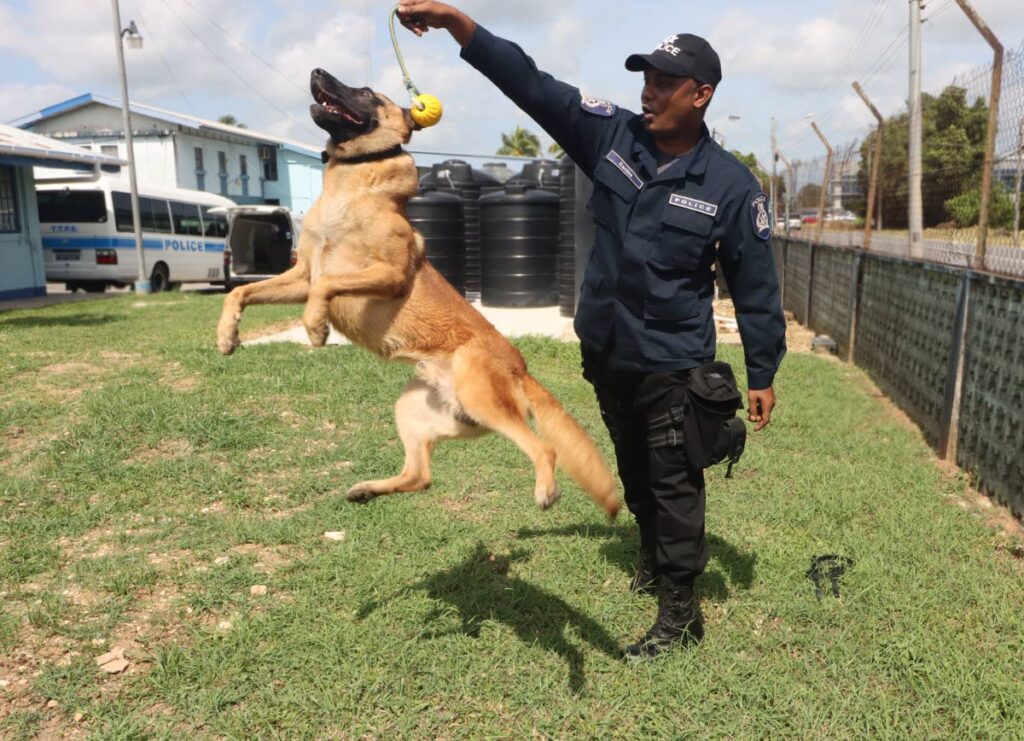
at the Canine Unit in Caroni. - ROGER JACOB
In Mayaro, Apollo, working fast as usual, left the market where he was supposed to be searching for drugs and ran to a car in the car park about 30 metres away. He paced up and down – then jumped onto a car’s bonnet, laid his head between the bonnet and the panel where the windshield wipers are located and indicated (froze and stared at the area).
When the police got inside the car, they found about 540 grammes of marijuana under the dashboard.
On another day in Marayo, Ammo, working with PC Simon Jacob Jr, found a large amount of marijuana and a gun.
“It was a hot day. Ammo was getting tired and Jacob asked me to take over,” said Ramlogan. “Apollo ran out of the van, immediately went to a pile of bricks and found 100 grammes of cocaine. I gave him his reward – his toy. We played.
"As soon as we stopped, he jumped off the road into the culvert and found 100 grammes of cocaine again.”
Ramlogan knows he has a special police partner.
“Knowing the dog from a puppy creates trust and a bond even stronger than what we have when we get fully trained dogs. I know him and any subtle changes in his behaviour. That comes from a long bonding period.”
Jacob agrees. His dog Ammo, named because only one ear stands up and a gun’s chamber can hold only one bullet, has found firearms and narcotics.
“He has a very high drive. When Ammo finds something, he goes crazy afterwards. He would ransack a house.
"He tires quickly, though. No one picked Ammo when they were assigning dogs. I chose him because he’s over-loving and works well alongside me. I love my dog.”
Of the B-litter dogs, born on Christmas Day 2020, Blaze, Blades and Beast are working. The two girls, Bella and Blu, didn’t make it as police dogs.
PC Abiola Benjamin said he had felt close to Blaze since he was born.
“When he was a puppy, the first time we took them out of the kennels, he was always running down the ball. He always liked to play a lot.”
Benjamin went on a long vacation and when he returned, he found Blaze had been written off the programme.
“I started throwing the toy for him and saw he still had the obedience training and toy drive. I believed Blaze could come back.
"We formed a bond, and I asked the new trainer, Enoch Romeo, to give him a chance as a drug-detection dog.”
Originally, Blaze had been assigned the role of an explosives-detection dog.
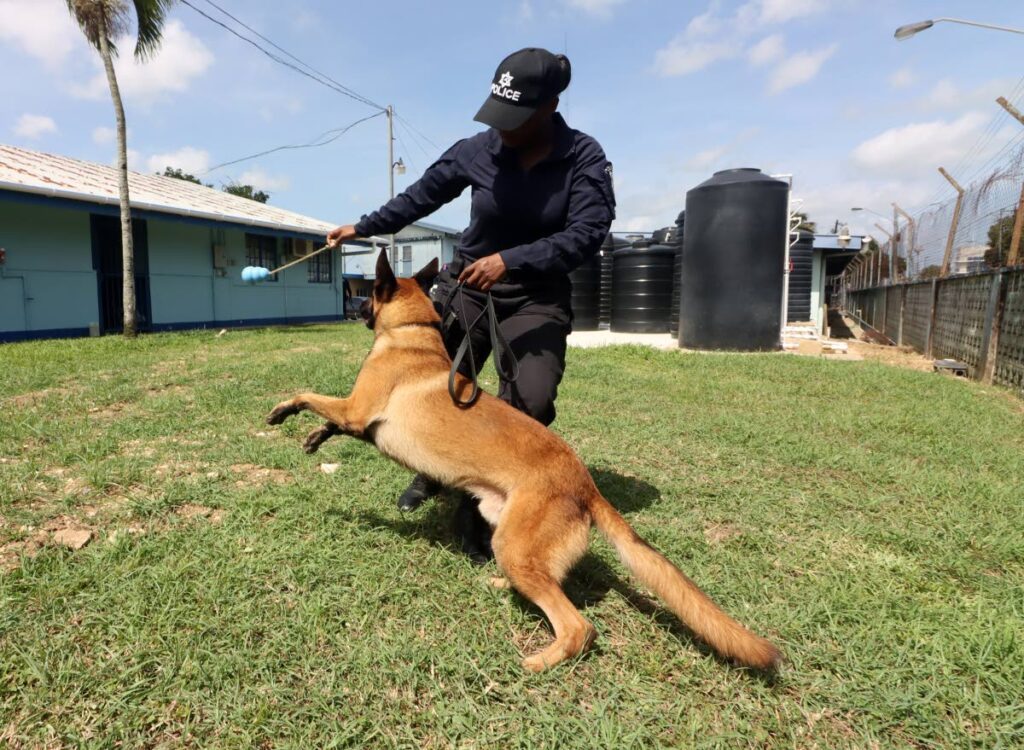
“But he doesn’t like to be out on his own, as those dogs must work. He likes when he looks back to see how far you are from him. So we converted him to a firearms and narcotics detection dog.”
Two weeks ago, Blaze searched the last house on an exercise and ran to some galvanised iron on the ground.
“He was tired in that heat. His tongue was out of his mouth, but he found marijuana.
"I gave him a big play, and when I took back the toy, he went back and found cocaine in a hollow clay block under galvanised iron, wood and old rubble.”
That was a day marked for an extra reward.
“When Blaze does well, I give him extra meat with his chow,” said Benjamin.
Benjamin looks forward to about seven more years of working with Blaze. Sometimes he looks back on the day he passed out of training with his dog.
“I was really happy for him. He was the black sheep in the litter, but he made it. Everyone had written him off.”
For Arrow, being an explosives-detection dog was a perfect fit.
“He is brave, has a great work ethic and loves people,” said his handler, WPC Tennal Sterling. “He will work away from me, which these dogs must do.”
Sterling has known Arrow since he was born.
“He’s intelligent and he has always been serious about everything.”
Like all explosives-detection dogs, Arrow checks Parliament and all the public places the President, Prime Minister and dignitaries go to.
Sterling looks forward to a long working life with Arrow.
“I would like to have him for his entire work life – until he is old and grey, and on retirement, I will gladly take him home. It’s special to work with a dog I helped to raise. I feel proud of him.”
The C puppies, German Short-Haired Pointers, aren’t working. Two D puppies, Dera and Diesel, are currently working. The police have reached the H litter.
Out of the darkness of the pandemic, the puppies emerged like a beacon of hope to the canine police section. Raising puppies had been tried in the past, but the desperation of the situation and dedication of the canine officers made this puppy programme a success.
“It’s an excellent programe, and we’re looking at ways to make it self-sufficient,” said Supt Michael Sooker of the Mounted and Canine Branch.
It looks like the police puppy programme is here to stay.
Check these links to previous stories about the canine police puppies:
Raising a hard-working police dog
https://newsday.co.tt/2021/03/10/raising-a-hard-working-police-dog/
The A-Team: Puppies in training for police duty
https://newsday.co.tt/2021/08/15/the-a-team-puppies-in-training-for-police-duty/
The D-Pups: No horsing around for new police recruits
https://newsday.co.tt/2021/11/21/the-d-pups-no-horsing-around-for-new-police-recruits/
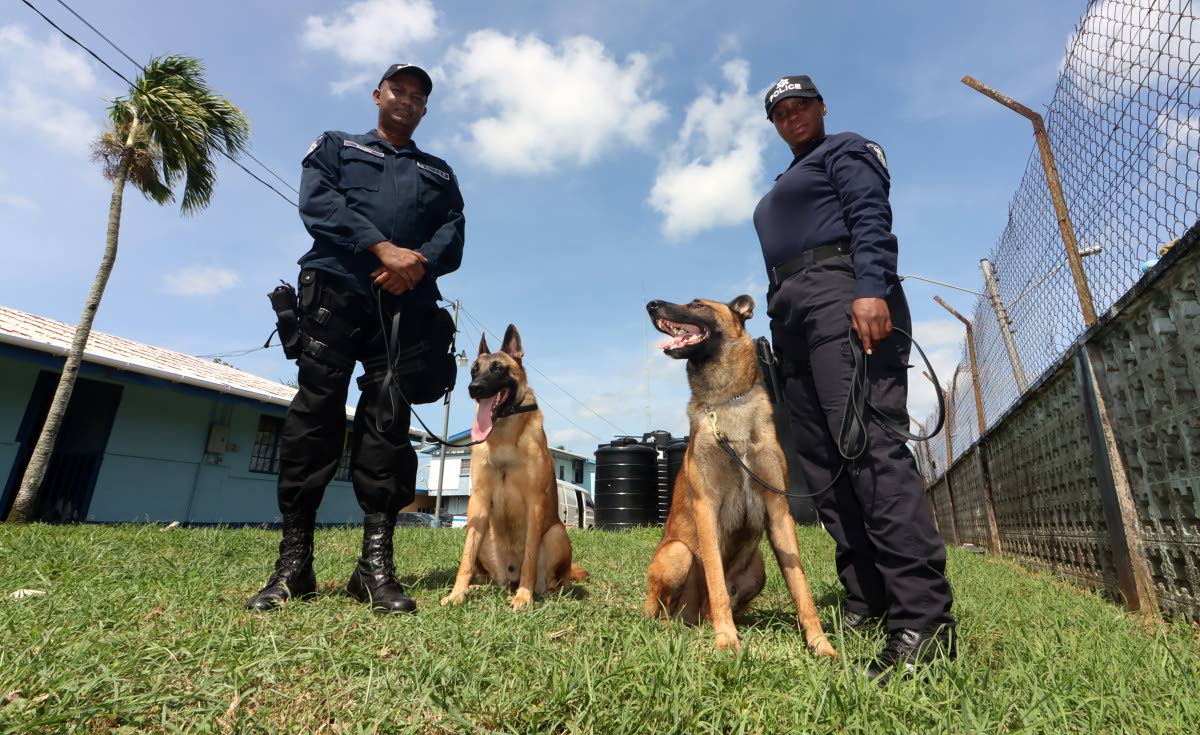
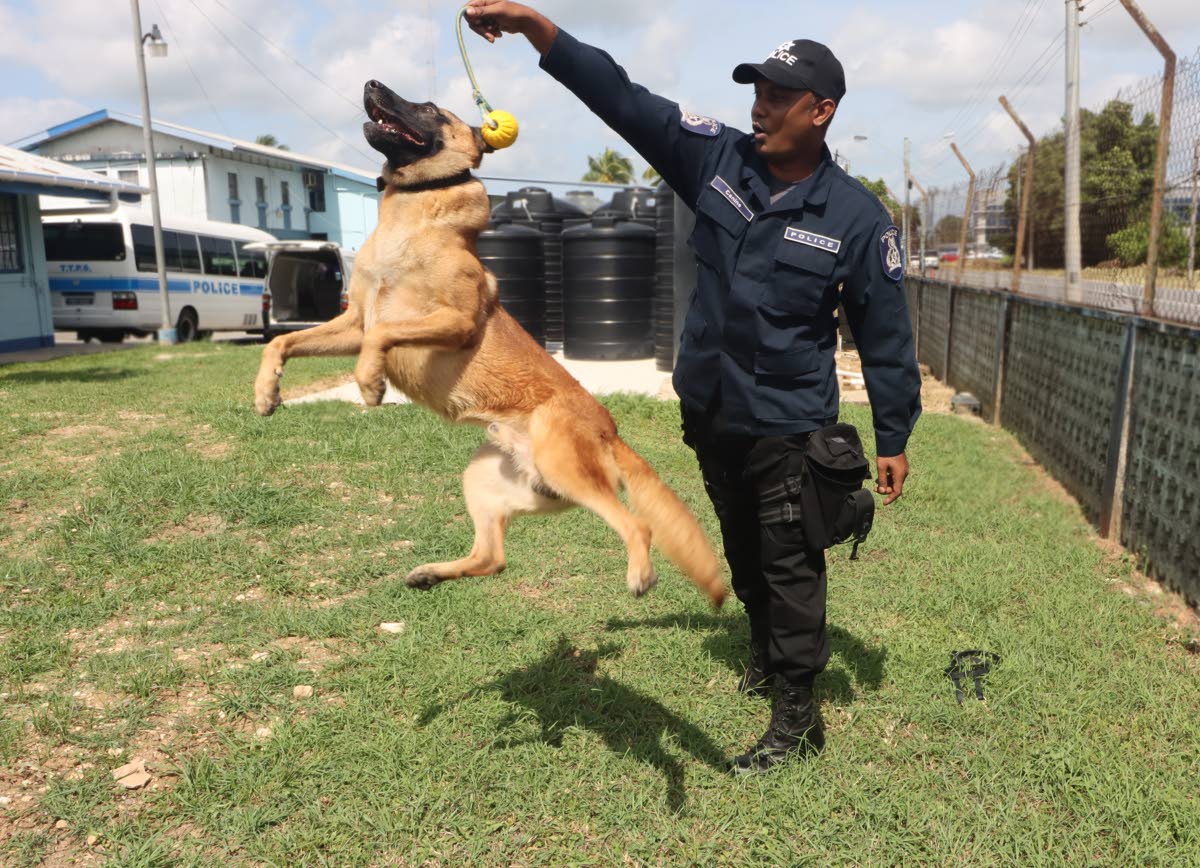

Comments
"Locally-bred police dogs assets in crime fight"